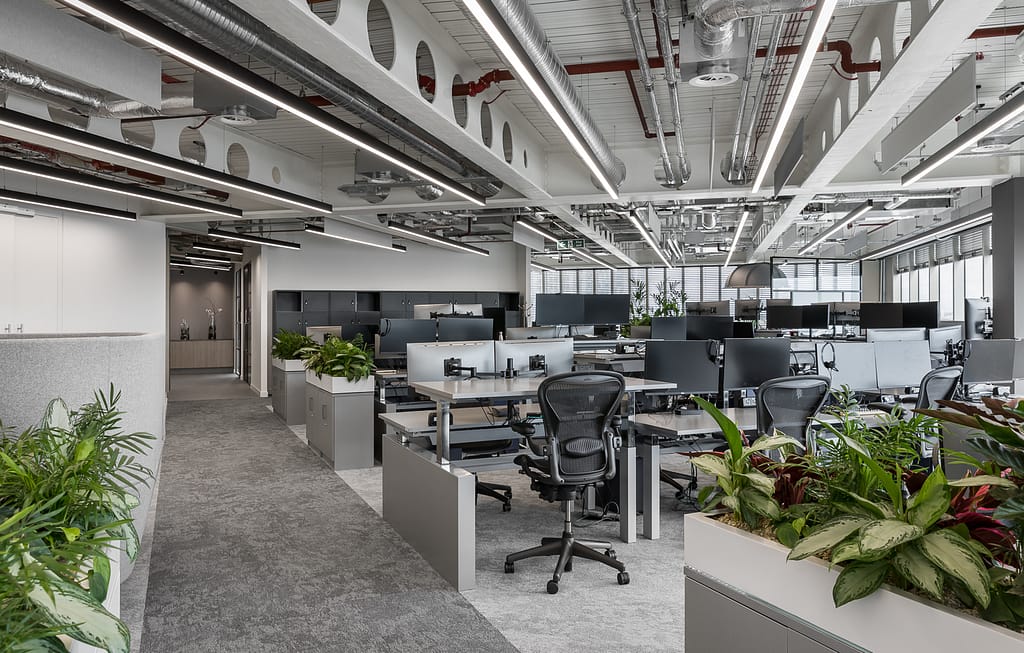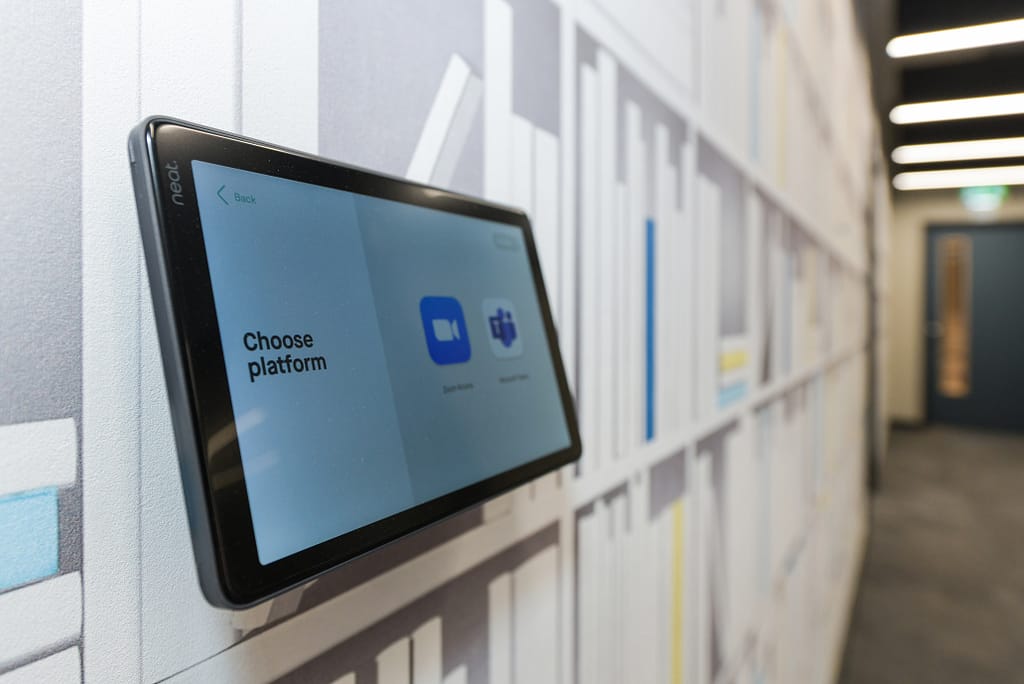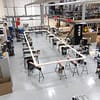Blog
Decarbonising Office Fit-Outs
A Sustainable Future for UK Workspaces
In the wake of the UK’s commitment to achieving net-zero carbon emissions by 2050, the focus on sustainable practices has intensified across various sectors. One area that holds significant potential for carbon reduction is the office fit-out industry. As businesses strive to create workspaces that are not only functional but also environmentally friendly, decarbonising office fit-outs has emerged as a crucial step towards a greener future.
The Importance of Decarbonising Office Fit-Outs
Office fit-outs involve the design, renovation, and furnishing of office spaces. Traditionally, this process can be resource-intensive, producing a considerable carbon footprint. From the extraction of raw materials to the energy consumed in manufacturing and transportation, every stage contributes to environmental degradation. Decarbonising office fit-outs means addressing and mitigating these impacts through sustainable practices and innovative solutions.

Key Strategies for Decarbonising Office Fit-Outs
1. Sustainable Material Selection
The choice of materials plays a pivotal role in reducing the carbon footprint of office fit-outs. Opting for sustainable materials such as reclaimed wood, recycled metal, and low-VOC (volatile organic compounds) paints can significantly lower emissions. Additionally, sourcing materials locally can reduce transportation-related carbon emissions.

2. Energy-Efficient Lighting and HVAC Systems
Lighting and heating, ventilation, and air conditioning (HVAC) systems are major contributors to energy consumption in office spaces. Incorporating energy-efficient LED lighting and smart HVAC systems can drastically cut down on energy usage. Moreover, integrating natural light and ventilation into office designs can further enhance energy efficiency.

3. Modular and Flexible Design
Modular office designs offer the flexibility to adapt to changing needs without extensive renovations. This approach not only reduces waste but also extends the lifespan of office interiors. By using modular components, businesses can reconfigure spaces with minimal disruption and resource use, aligning with the principles of a circular economy.
4. Embracing the Circular Economy
The circular economy model promotes the reuse and recycling of materials, reducing the need for new resources. In the context of office fit-outs, this means designing spaces with disassembly and recycling in mind. Furniture and fixtures that can be easily dismantled and repurposed contribute to a sustainable lifecycle, minimising waste and lowering carbon emissions.
5. Smart Technology Integration
Smart technologies can optimise energy usage and improve the efficiency of office operations. For instance, smart sensors can adjust lighting and HVAC systems based on occupancy, reducing unnecessary energy consumption. Additionally, energy management systems can provide real-time data on energy use, enabling businesses to identify areas for improvement and implement targeted sustainability measures.

6. Waste Reduction and Management
Effective waste management is critical in decarbonising office fit-outs. Implementing recycling programmes, reducing single-use plastics, and encouraging digital documentation over paper use are practical steps that can make a significant difference. Partnering with waste management companies that prioritise recycling and responsible disposal further enhances sustainability efforts.
The Role of Certification and Standards
Adhering to established sustainability standards and certifications can guide businesses in achieving their decarbonisation goals. Certifications such as BREEAM (Building Research Establishment Environmental Assessment Method) and LEED (Leadership in Energy and Environmental Design) provide frameworks for assessing and improving the environmental performance of office fit-outs. These certifications not only validate sustainability efforts but also enhance the credibility and marketability of green office spaces.
Case Studies: Leading by Example
Several UK companies are setting the standard for decarbonising office fit-outs, demonstrating that sustainability and business success can go hand in hand.
Sky’s Sustainable Office Fit-Out in London
Sky, the UK-based media and telecommunications company, took significant steps to decarbonise its London headquarters at Sky Central. The company undertook a large-scale refurbishment that prioritised sustainability. Sky integrated energy-efficient systems, including advanced HVAC technologies that use less energy and water. Additionally, the project utilised recycled materials, such as reclaimed wood and steel, reducing the need for new raw materials and significantly lowering the building’s carbon footprint. The design also incorporated biophilic elements, such as living walls and natural light, which not only reduce energy consumption but also improve employee well-being. As a result, Sky Central received a BREEAM Excellent rating, reflecting its commitment to sustainability.
PwC’s Circular Economy Approach in Manchester
PwC, a global professional services firm, made headlines with its new Manchester office at No. 1 Spinningfields. PwC adopted a circular economy approach for this fit-out, focusing on reusing and repurposing materials wherever possible. The company salvaged furniture and fixtures from its previous office and other projects, refurbishing them for the new space. This approach drastically reduced the need for new resources and minimised waste. PwC also partnered with local suppliers to source materials, further reducing the carbon footprint associated with transportation. The office achieved a BREEAM Outstanding rating, and the project is celebrated as one of the most sustainable office fit-outs in the UK, with an emphasis on waste reduction and environmental responsibility.
The Zero-Waste Coworking Space: Upcycle Studio in Manchester
Upcycle Studio, a coworking space in Manchester, is a prime example of a business that has embraced a zero-waste philosophy in its office fit-out. The space was meticulously planned to minimise waste from the outset. All materials used were either recycled, upcycled, or sustainably sourced. For instance, desks and chairs were made from reclaimed wood, while lighting fixtures were crafted from repurposed metal. During the renovation, waste was carefully managed to ensure that nearly all of it was either recycled or composted. The result is a workspace that not only achieved net-zero emissions but also fosters a culture of sustainability among its users. Upcycle Studio’s approach demonstrates how small businesses can make a big impact through thoughtful and sustainable office design.
The Path Forward
Decarbonising office fit-outs is not just a trend but a necessity in the quest for a sustainable future. As the UK moves towards its net-zero target, businesses must embrace innovative and eco-friendly practices in their workspace designs. By prioritising sustainability in office fit-outs, companies can contribute to carbon reduction, enhance their corporate social responsibility, and create healthier, more productive environments for their employees.
The journey towards decarbonising office fit-outs is a collaborative effort that requires commitment, creativity, and a willingness to embrace change. By adopting sustainable materials, energy-efficient systems, and smart technologies, businesses can play a vital role in shaping a greener future for the UK and beyond.



